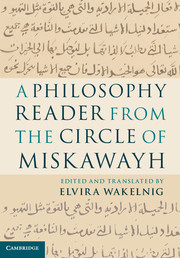Arabic Text and English Translation
Published online by Cambridge University Press: 30 September 2021
Summary
(1) … that they apply to the First something that certainly does not do Him justice.
(2) He says in his letter to Dionysius: do not apply to the First attributes which are unlike Him, in order not to move away from the notion of the One towards the meaning of souls, forms or powers, or to relate any kind of multiplicity or something describable or knowable to Him. Rather, you must interpret Him as something indescribable and unknowable. The soul is always adhering to His love. It gets close to Him by diminishing the multiplicity in itself and in this way of ascension it hastens to Him. It leaves behind all the sensations, concepts, imaginings, desires and opinions and confirms Him by magnifying His leadership and eminence. Thus it comes close to the One through Oneness, not in order to come to know Him, but in order to be joined to Him. As to the multiplicity of investigation and interpretation, it does not employ them at all. It does not reach Him by concepts or any of the things which resemble and are suited for us [i.e. as man]. If you do that nevertheless, you move away from participation in the One and descend to the perishable life which is our life.
(3) He says: reason and experience have shown me that whenever I am contemplating divine matters, God's providence is sheltering me, and whenever I stop doing that owing to bodily matters, His providence keeps itself from me. So he who does not want to lose God's providence, should not cease contemplating Him.
(4) He says: I had ascended to the three heavens and sought to ascend towards the fourth heaven, when it told me that soul and nature had sought what intellect prevented [them] from entering. He means by the first heaven skilful philosophy, by the second one natural science and by the third one the intellectual forms.
(5) Hermes says: it is difficult to learn the tru th about the Creator - exalted be His name - and impossible to describe Him. For He is imperceptible.
- Type
- Chapter
- Information
- A Philosophy Reader from the Circle of MiskawayhText, Translation and Commentary, pp. 63 - 340Publisher: Cambridge University PressPrint publication year: 2014



